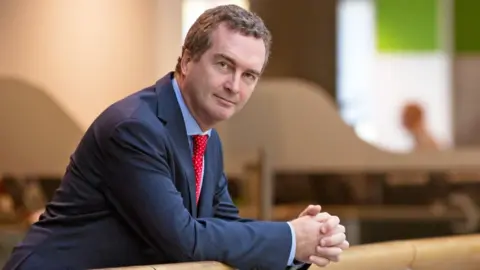Russia causing 'cyber-space mayhem', says ex-GCHQ boss
Russian authorities are a threat to democracy, former GCHQ director Robert Hannigan has said.
There was "a disproportionate amount of mayhem in cyber-space" coming from the country, he told the BBC.
Mr Hannigan urged people to "push back" against the behaviour of the Russian state, adding some form of cyber-retaliation may be necessary in future.
Sanctions could also be imposed to highlight the Russian state's current activity was unacceptable, he added.
"Of course not everything is run by the Russian state," Mr Hannigan told BBC Radio 4's Today programme.
"There is an overlap of crime and state, and a deeply corrupt system that allows crime to flourish, but the Russian state could do a lot to stop that and it could certainly rein in its own state activity."
 GCHQ
GCHQMr Hannigan praised French President Emmanuel Macron and German Chancellor Angela Merkel for "calling out" Russian state activity.
"I think starting to talk about it is good. Macron himself said in front of Putin, at a press conference, in a very striking way, that this was unacceptable," he said.

Analysis: Gordon Correra, BBC Security Correspondent
Russia's cyber-operations became a major issue during Robert Hannigan's' time running GCHQ.
Russian cyber-espionage has been going on for years, but recently Western intelligence agencies watched with alarm as hackers operating out of Russia appeared willing to take more aggressive and risky actions.
One sign of that was the takedown of the French TV5 Monde channel, made to look like the work of hackers related to the so-called Islamic State but traced to Russia.
This left British spies wondering whether Moscow had been testing out its disruptive capability.
GCHQ was also the first to spot signs that Russia had penetrated the Democratic Party in the US, and it informed authorities in Washington.
But as Russian operations seemed to become more brazen, the questions have grown over how best to respond and deter such activities.
And that process has been complicated by the controversy in Washington surrounding the investigation of possible links between the US President Donald Trump's election campaign and Russia.
